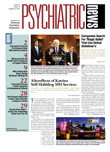The effort to overcome political obstacles in Congress to enacting far-reaching health care reform this fall has drawn the support of a broad spectrum of advocates, including mental health organizations.
Several of these organizations have urged their members and others to participate in the increasingly contentious national debate over health care reform. These efforts have included providing public information on the mental-health-related aspects of reform bills under consideration and coordinating campaigns to win passage of health care reform legislation.
APA has undertaken efforts to inform its members of various legislative proposals under consideration, including weekly updates on legislative developments from its Department of Government Relations (DGR). A special health reform update sent via e-mail urged psychiatrists to attend their local town-hall meetings with members of Congress and “share support for crucial provisions ensuring access to coverage and reforming Medicare payment for physicians.” Moreover, Psychiatric News has run in-depth coverage in each issue since health care reform first appeared on the new administration's agenda.
Nicholas Meyers, director of DGR, added that APA is targeting its legislative advocacy to areas where the most direct impact on patients and members can be realized. For example, APA joined with the Bazelon Center for Mental Health Law in highlighting loopholes in proposed legislation in the Senate Committee on Health, Education, Labor, and Pensions that could have substantially undermined last year's mental health parity law. The problem was addressed by subsequent legislative changes. Other areas of attention include workforce and reimbursement.
Many town-hall meetings held this past summer by members of Congress drew national media coverage when angry constituents loudly protested expansions in the power and cost of government that health reform could bring (see
Path to Health Care Reform Becoming a Steeper Climb). The negative reactions at the meetings went hand in hand with dropping public support for the effort. An August Kaiser Family Foundation poll found that the portion of the public who thought that the nation as a whole would benefit from reform dropped to 45 percent from 51 percent in the preceding month.
But health care reform supporters felt encouraged at some town-hall meetings. At two such events led by President Obama in July and August, members of the public specifically asked Obama about the inclusion of mental health care in health care reform, and he expressed support for it.
“I've long been a supporter of mental health services as part of a package, and I think that's important,” Obama said at a town-hall meeting in Shaker Heights, Ohio, in July. Obama also called for more preventive care.
Mental health advocates said that their efforts to expand access to mental health care has a proven record of effectiveness.
“We were successful in enacting mental health parity, and grass-roots advocacy was an important part of that,” said Steve Vetzner, a spokesperson for Mental Health America.
The parity law enacted in 2008, known as the Paul Wellstone and Pete Domenici Mental Health Parity and Addiction Equity Act, requires health plans that cover 50 or more workers and offer mental health benefits to have the same service coverage and payment requirements as those for other health benefits.
Chris Koyanagi, a policy director at the Bazelon Center for Mental Health Law, said people with an interest in improving access to mental health care should engage in the health reform debate. Earlier in the summer, the Bazelon Center had focused on sending updates to supporters on features of various health reform bills, but in recent weeks the center began to urge them to take action to support reform.
“It's much more important that people who want reform be heard from at this stage, given the noise from the people who don't” want reform, she said.
The strongly held objections of health reform critics expressed at town-hall meetings about the high costs and expanded government role in health care parallel the reform-related advertising campaigns that are unprecedented in their size and scope. Nationwide, more than $57 million has been spent this year through August on advertising related to health care reform, according to media reports. At $48 million, proponents have far outspent opponents.
The spending is set to increase dramatically as Congress again takes up consideration of a health care reform package this month. Some of the funds will come from the AMA as a member of the new pro-reform coalition called Americans for Stable Quality Care. Other members include the Federation of American Hospitals, the Pharmaceutical Research and Manufacturers of America (PhRMA), and the Service Employees International Union. The coalition announced plans in August to spend $12 million on a television advertising campaign aimed at winning support for current health reform plans.
PhRMA's spending on TV ads is expected to increase to a total of $150 million this fall, according to media reports. By way of comparison, the 2008 presidential campaign of Sen. John McCain spent $126 million on television ads.
The Bazelon Center's information on health care reform and its advocacy efforts is posted at<www.bazelon.org/issues/healthreform/index.htm>. APA's information is posted at<www.psych.org/MainMenu/AdvocacyGovernmentRelations/GovernmentRelations.aspx>. Mental Health America's information is posted at<www.nmha.org/>.▪

